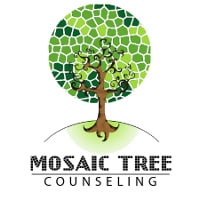Mosaic Tree Counseling
Kind words can be short and easy to speak, but their echoes are truly endless.
Make appointmentTherapy Modalities
MTC looks at the following factors, from the Intake paperwork and evaluation on the first session:
- Type of disorder or situation
- Severity of symptoms
- How long there have been symptoms
- How quickly progress is made
- How much stress the patient/client is experiencing
- How much support the patient/client receives from family members and other people
- How much the mental health concerns interfere with day-to-day life
- Cost and insurance limitations
Then, it is determined the type of therapy. Please note that family therapy can apply to any of the following. We also have Christian Counselors available, if you prefer Christian counseling.
Brief Solution Focused
Typical Length: 5 sessions, 45 minutes each
Description: Usually focused on the present or on the future.
This reflects the basic belief that problems are best solved by focusing on what is already working, and how a patient/client would like their life to be, rather than focusing on the past and the origin of problems.
Example: Employee Assistance Programs, disagreement with a co-worker, argument with a friend, etc.
Cognitive Behavioral Therapy
Approximate Length: 10 to 20 sessions, 45 minutes each
Description: Identifying troubling situations, becoming aware of one’s own thoughts and beliefs, identifying negative or inaccurate thinking and reshaping this thinking
Example: grief, anger, adjustment/transitions, etc.
Couples Counseling
Length: Improvements are usually seen within 4-6 sessions, 45 minutes long. An average course is about 12-16 sessions.
Description: The effectiveness of the marriage counseling is dependent on the motivation level of both partners. A motivated couple can begin to see their problems from a new perspective and learn new ways to recognize and resolve conflict to rebuild their relationship
Example: infidelity, financial, parenting, communication
Resource: The Gottman Institute
Multi-Systemic Therapy
Length: an intense 6 months – meeting at least two times a week, 45 minutes each
Description: It is intensive, family-focused therapy. Addresses people not just individually but in relationship with interactions of groups, their patterns and dynamics.
Treatment must target the many “systems” that impact the person, including the family and school environment, or work.
Example: serious child and adolescent disruptive behavior problems, delinquency, and substance abuse
Resource: Littell, JH; Popa, M; Forsythe, B (October 19, 2005). “Multisystemic Therapy for social, emotional, and behavioral problems in youth aged 10-17”. The Cochrane Database of Systematic Reviews (4)
Play Therapy
Length: Building rapport can take 6-8 sessions, therapy can take up to 20 sessions, sessions can be from 30 minutes to 45 minutes long
Description: It helps children make sense of their world, reaching their full potential while developing resilience and emotional intelligence
Example: communication difficulties, trauma, loss, abuse, transitions, social skills, and more
Resource: Irish Association for Play Therapy
Psychoeducation Classes
Length: Generally 6-8 classes, usually 45 minutes each
Description: An in-depth evaluation, assessment, or screening, dependent on your need
Example: PsychoSocial, PsychoSexual, ADHD Screening, Court Recommendation
Psychological Evaluations
Length: Depending on type of evaluation, 45 minutes to 2 1/2 hours
Description: An in-depth evaluation, assessment, or screening, dependent on your need
Example: PsychoSocial, PsychoSexual, ADHD Screening, Court Recommendation
Psychotherapy
Length: Can take 2 years or throughout one’s life, if there is a long-term mental illness or other long-term concerns
Description: Patient/client learns about his/her condition as well as their moods, feelings, thoughts and behaviors.
- There is a medical model and a humanistic model. In the medical model the patient is seen as unwell and the therapist employs their skill to help the patient back to health.
- In the humanistic model, the Therapist is the helper of facilitating the client’s insight into the roots of their difficulties.
Example: Generalized Anxiety Disorder, Depression, Trauma, Bipolar Disorder, Personality Disorders
Therapy Modalities
Abuse & Neglect
ADHD
Anxiety
Bipolar
Career Counseling
Communication Difficulties
Couples Therapy
Depression
Eating Disorders
Employee Assistance
Impulsive Behavior
Obsessive Compulsive Disorder (OCD)
Oppositional Defiant Disorder (ODD)
Play Therapy
Posttraumatic Stress Disorder (PTSD)
Self Esteem
Self Mutilation
Shop
Social Skills

